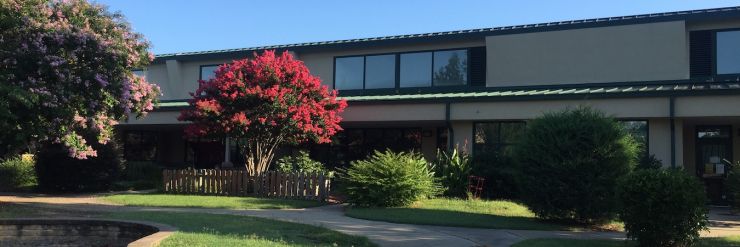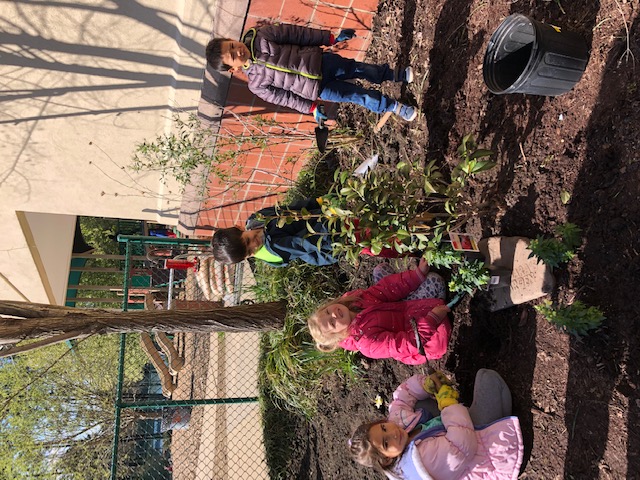What’s the difference between a Montessori school and a traditional school?
At the Children’s House level, Montessori emphasizes learning through all five senses, not just through listening, watching, or reading. Children in Montessori classes learn at their own, individual pace and according to their own choice of activities from hundreds of possibilities. They are not required to sit and listen to a teacher talk to them as a group, but are engaged in individual or group activities of their own, with materials that have been introduced to them 1:1 by the teacher who knows what each child is ready to do. Learning is an exciting process of discovery, leading to concentration, motivation, self-discipline, and a love of learning.
In elementary and into middle school, students learn to do independent research, collaborate with fellow students on group projects, interact with the external community to gather information, whether for field trips, community service or interview specialists for research, create group presentations and science projects, and beyond. Students are also engaged in art and music, drama and physical activity and secondary language lessons. There is respect for the choices of the children, entrusting their own engagement and enjoyment in their educational journey.
Montessori classes are comprised of three-year-age groups (3-6, 2.5-6, 6-12, and so on) that form communities in which the older children spontaneously share their knowledge with the younger ones. These are wonderful leadership opportunities for the older students, and create an atmosphere of community and collaboration.
A growing body of research suggests that Montessori students perform as well as or better—academically and socially—than their non-Montessori peers. These benefits grow as children have more experience in a Montessori environment.
Is there a specific Montessori curriculum that must be followed?
Montessori schools teach the same basic skills as traditional schools, and offer a rigorous academic program. Sterling adheres to not only the requirements of The American Montessori Society (AMS), but also those of the North Carolina Department of Instruction and the Office of Charter Schools. Most of the subject areas in a Montessori classroom are familiar—math, science, history, geography, and language—but they are presented through hands-on experiences with didactic materials and an integrated approach that weaves separate strands of the curriculum together. This approach demonstrates the interrelatedness of all things.
Montessori uses different terminology. What do they mean?
Dr. Maria Montessori introduced many new terms and concepts to describe how children grow and learn. Sterling faculty and staff use these terms as well. For a detailed list of terminology, please visit this page from the American Montessori Society.
Can Montessori practices be implemented at home?
Yes, you can use Montessori principles of child development at home. Look at your home through your child's eyes. Children thrive with a sense of belonging and that their tasks having significance, both which can be achieved by participating fully in the routines of everyday life. It’s important for adults not to underestimate the abilities of a child, and allowing them to “help me do it by myself”.
Areas where children can participate in these meaningful activities including helping with meal preparation, cleaning, gardening, caring for clothes and pets. By providing opportunities for independence, parents are giving students a chance to boost their self-esteem and build the skills needed for life-long learning.
What ages are ideal for Montessori education?
Many perceive that Montessori education is only applicable for the preschool/early-education year, however, many infant/toddler programs (ages 2 months to 3 years) exist, as well as elementary (ages 6-12), adolescent (ages 12-15) and even a few Montessori high schools. Sterling serves children ages 3-14, or grades PreK-3 – 8th grade. We are committed to success at each level and age.
Is Montessori education good for children with learning differences? Or children that are gifted?
An advantage of the Montessori approach—including multi-age classrooms with students of varying abilities and interests—is that it allows each child to work at his or her own pace. Students whose strengths and interests propel them to higher levels of learning can find intellectual challenge without being separated from their peers. The same is true for students who may need extra guidance and support, including students with special needs such as ADHD, learning differences, and autism spectrum disorders: each can progress through the curriculum at her own comfortable pace, without feeling pressure to “catch up.”
Every child has unique strengths and interests that the Montessori environment nurtures and supports.
What are the benefits of a Montessori education, especially at higher grades?
The benefits of Montessori—the emphasis on independent learning, for example, and the warm, supportive community—continue to be important at each stage of development as children grow into lifelong learners and responsible citizens of the world. As your child matures in her school activities so will her independence, problem-solving abilities, social maturity, and academic skills.
At the higher levels, Montessori programs combine rigorous student-centered academic studies with purposeful work—often including out-of-classroom excursions such as service learning, internships, outdoor education, and entrepreneurship designed to cultivate global citizenship and civic responsibility—preparing students to become contributing adults who are self-confident and possess the skills needed to thrive as active citizens in society.
To assess what is best for your child’s next stage of development, speak with his teacher to discuss your child’s learning strengths, interests, and areas for development, and your –and the school’s—learning goals for him. Observe the higher-level classroom environments to see, firsthand, what your child will experience as she grows and ask to speak with parents of children in the next level to learn about their experiences.
Are Montessori children successful?
On-going research continues to show that Montessori students are well prepared for life academically, socially and emotionally. In addition to scoring well on standardized tests, Montessori children are ranked above average on such criteria as following directions, turning in work on time, listening attentively, using basic skills, showing responsibility, asking critical questions and adapting to new situations.
Research also shows that transitioning from a Montessori classroom to a more traditional program continues that success. Students carry their “Montessori habits” with them to the new environment, maintaining their engagement and love of learning.


